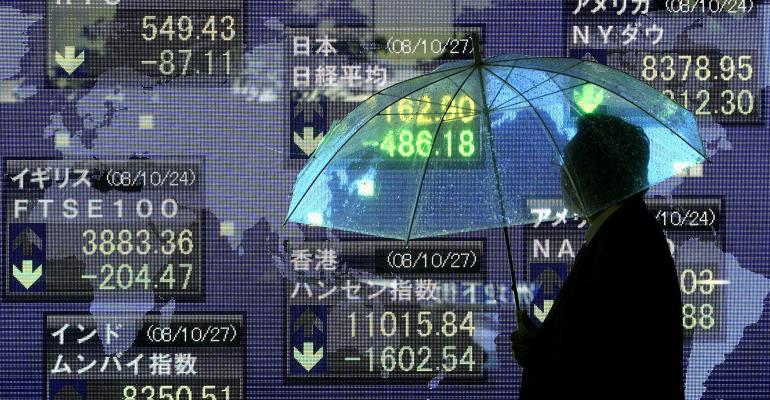By Yuko Takeo, Livia Yap and Min Jeong Lee
(Bloomberg) --Bond billionaire Jeffrey Gundlach says Japanese stocks are cheap. A lot of investors are starting to agree.
The head of DoubleLine Capital says Tokyo equities may be a way to play the reflation trade, reiterating the bullish stance he took in 2013. With a Federal Reserve interest-rate increase next week seen as a certainty and traders turning their focus to how many more hikes will follow, Japan’s stock market is primed to benefit from a weaker yen and money managers shifting into shares from bonds.
The chorus of bulls on Japanese equities is getting louder. Foreign investors are plowing money into Tokyo stocks and U.S-listed exchange-traded funds tracking the market, and the Topix index is headed for its highest close since 2015.
“We’ve become bullish in the past three months,” said Kazuyuki Terao, chief investment officer at Allianz Global Investors Japan Co. in Tokyo. “The U.S. economy is headed in the right direction, which is a big factor. And Japan is moving from deflation to inflation.”

Foreign investors bought a net 1.8 trillion yen ($15.6 billion) in Japanese stocks since the week of Donald Trump’s election. His victory spurred expectations for infrastructure spending and inflation in the U.S., sending the yen to the biggest quarterly drop against the dollar in more than two decades. After initially plunging in reaction to the vote, the Topix jumped almost 20 percent through Thursday’s close. The gauge climbed 1.2 percent in Tokyo on Friday.
Traders have been returning to the two biggest U.S.-listed Japan stock ETFs that they spurned for most of last year. They’ve put more than $740 million into BlackRock Inc.’s iShares MSCI Japan ETF and WisdomTree Investments Inc.’s Japan Hedged Equity Fund in 2017, after both funds saw multibillion-dollar outflows last year that ranked among the largest of all ETFs trading in the U.S.
The benefits of a rising stock market are also being felt at home. At the end of last week, the world’s biggest pension fund, the $1.3 trillion Government Pension Investment Fund, reported its biggest-ever quarterly investment gain -- some $92 billion. It came less than 2 1/2 years after the retirement-savings investor cut bonds to buy more shares, as Bank of Japan stimulus and later negative interest rates reduced the attractiveness of the country’s debt.
Abenomics Success
“A huge success of Abenomics is asset allocation,” said Martin Malone, global macro policy strategist at Mint Partners in London, referring to Prime Minister Shinzo Abe’s strategy to revive the country’s economy. “Aggressive BOJ quantitative easing has led to a major shift from domestic bonds,” he said. GPIF’s “shift to reflation is starting to look timely.”
There are reasons for confidence in the economy, too. Buoyed by global tailwinds, Japan’s gross domestic product is poised for its longest run of growth in a decade. Revised fourth-quarter GDP figures released this week showed a better-than-expected increase in capital expenditure, which is crucial in a country where a deflationary mindset has prompted companies to hoard cash. Bank lending is encouraging, and there are even some signs of inflation after it proved elusive for much of Abe’s term.
Gundlach, who manages the DoubleLine Total Return Bond Fund, was speaking during a webcast on Tuesday. He also said the Fed is likely to begin raising rates sequentially as inflation and growth speed up.
But while investors such as him see that as a reason for optimism about Japan stocks, the best-laid theories of Topix bulls have fallen flat before. Predicting the future can be harder in a market so tied to the yen, which can move on any manner of global events -- from North Korean missiles to U.S. debt-ceiling negotiations.

Still, the Topix up is more than twice as much as the S&P 500 Index since Nov. 10, and trades at a 12 percent discount by price to estimated earnings. After closing last year with two straight quarters of declines, both the Bloomberg U.S. Treasury Bond Index and the Bloomberg Japan Sovereign Bond Index have extended losses in 2017. And as traders price in a 100 percent chance the Fed will announce higher rates on March 15, the yen has weakened to 115.36 per dollar.
With all that in mind, Nomura Holdings Inc. isn’t daunted by the risks facing Japan’s stock market, such as when France chooses a new president this spring.
“We have the European elections coming and negative policies from Trump,” said Masahiko Sato, an equity market analyst at the brokerage in Tokyo. “But if a great rotation from bonds to stocks is truly happening, I believe shares will continue to rise.”
To contact the reporters on this story: Yuko Takeo in Tokyo at [email protected] ;Livia Yap in Singapore at [email protected] ;Min Jeong Lee in Tokyo at [email protected] To contact the editors responsible for this story: Divya Balji at [email protected] Tom Redmond, Sarah McDonald





